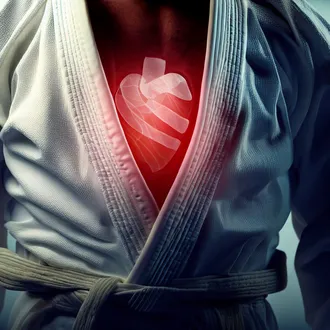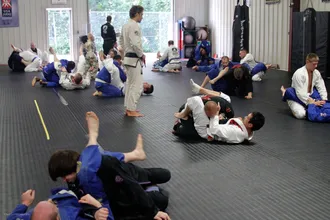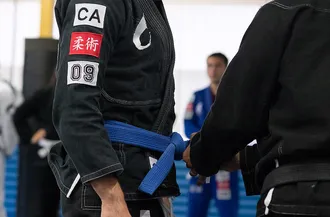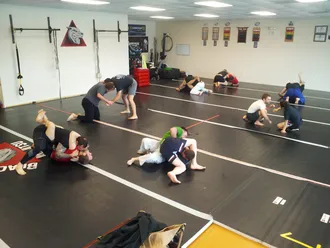
If you're considering taking up Brazilian Jiu Jitsu (BJJ), you're probably aware of its physical and mental benefits. But have you ever wondered, "Is BJJ good for your heart?"
The short answer is yes! In this article, we'll dive deep into the incredible cardiovascular benefits of BJJ and why this martial art is an excellent workout for heart health.
What is Brazilian Jiu-Jitsu?
Before we explore the heart-healthy benefits of BJJ, let's quickly define what it is. Brazilian Jiu-Jitsu (BJJ) is a grappling-based martial art that focuses on ground control, submissions, and positional dominance. It emphasizes leverage and technique over brute strength, making it an accessible sport for all body types.
Unlike striking-based martial arts, BJJ revolves around strategy, body mechanics, and efficient movement. This combination makes it an excellent full-body workout while also sharpening mental acuity.
How Good is BJJ for Cardio and Heart Health?
Is BJJ good cardio? Absolutely! Brazilian Jiu-Jitsu is an intense, full-body workout that elevates your heart rate and challenges your cardiovascular endurance.
During a typical training session, you'll engage in drilling, rolling (sparring), and positional training. These high-intensity activities force your heart and lungs to work efficiently, improving both aerobic and anaerobic conditioning.
Many people wonder, "Is BJJ enough cardio, or should I supplement it with other exercises?" While BJJ alone offers an excellent cardiovascular workout, adding specific BJJ-focused cardio training can further enhance your endurance. We'll cover the best ways to improve your cardio for BJJ later in the article.
Heart Health and Cardiovascular Benefits of BJJ
Now, let's get to the heart of the matter—how BJJ can benefit your cardiovascular health and improve your overall fitness.
Boost Your Cardiovascular Endurance with BJJ
One of the biggest benefits of BJJ is its impact on cardiovascular endurance. Whether you're drilling techniques, engaging in live rolling, or participating in intense positional training, your heart rate stays elevated for extended periods.
Over time, this forces your cardiovascular system to become more efficient, improving heart and lung function. If you're looking to improve cardio for BJJ, consistency in training is key.
How BJJ Helps with Weight Loss and Heart Health
Maintaining a healthy weight is crucial for heart health, and BJJ is an excellent way to burn calories while building lean muscle. A typical BJJ session can burn anywhere from 500 to 1,000 calories, depending on intensity.
Because BJJ combines strength and cardio elements, it supports fat loss while improving muscular endurance—key factors for long-term heart health.
Reduce Stress and Strengthen Your Heart with BJJ
High stress levels can negatively impact heart health, but BJJ provides an effective outlet to reduce stress while improving your mental and cardiovascular well-being.
During training, you're fully focused on the moment—executing techniques and reacting to your opponent. This intense mental engagement lowers cortisol levels, reducing the risk of high blood pressure and other heart-related issues.
Why BJJ Improves Blood Circulation and Lowers Blood Pressure
One of the hidden benefits of BJJ is its positive effect on blood circulation. As you engage in grappling movements, your heart works harder to pump oxygen-rich blood throughout your body.
This improved circulation helps lower blood pressure by reducing arterial stiffness and promoting better overall vascular health. A well-functioning cardiovascular system means a lower risk of heart disease, strokes, and other heart-related issues.
Building Stronger Muscles, Including the Heart
BJJ training strengthens various muscle groups, including the heart itself. A stronger heart can pump blood more efficiently, reducing the risk of heart-related issues.
Moreover, the continuous movement and positional changes in BJJ stimulate the lymphatic system, helping to remove waste products and toxins from your tissues.
All of these factors combined result in improved blood flow, which not only benefits your physical performance but also contributes to overall health and well-being.
How BJJ Improves Heart Rate Variability (HRV)
Heart rate variability (HRV) measures the variation in time between consecutive heartbeats. A higher HRV is associated with better cardiac health, stress management, and overall recovery.
Training in BJJ naturally improves HRV by exposing your body to varying intensity levels. During a session, you transition between high-intensity rolling, brief recovery periods, and controlled breathing, forcing your cardiovascular system to adapt.
Benefits of increased HRV through BJJ:
- Better Recovery: A higher HRV indicates improved nervous system function and faster recovery between sessions.
- Reduced Stress: BJJ training enhances parasympathetic nervous system activity, reducing cortisol levels.
- Improved Endurance: A well-regulated heart rate allows for sustained effort during longer sparring rounds.
To further enhance HRV, focus on breath control exercises, proper sleep, and active recovery strategies.
How to Start BJJ Safely and Improve Your Heart Health
Now that you understand how BJJ benefits cardiovascular health, you might be wondering, “How can I start training safely, especially if I’m concerned about my heart?” Whether you’re new to exercise or returning after a long break, here’s how to ease into BJJ while prioritizing heart health.
Find a Reputable BJJ School
Before stepping onto the mats, research and choose a well-established BJJ academy with experienced instructors. A good school will emphasize safety and proper technique, ensuring that beginners progress at a comfortable pace.
Consider attending a beginner-friendly class where instructors focus on fundamental movements and controlled sparring. If you're unsure what to expect, check out what happens in a typical BJJ class.
Start Slowly and Listen to Your Body
If you’re new to BJJ or haven't exercised in a while, it’s important to start gradually. Your cardiovascular endurance will improve over time, so don’t feel pressured to push beyond your limits in the beginning.
- Train 1-2 times per week at first to allow your body to adjust.
- Focus on drilling and technique before engaging in full-intensity sparring.
- Take breaks between rounds to monitor your heart rate and breathing.
Train Consistently but Don’t Overtrain
One of the biggest mistakes beginners make is either training too much too soon or not training consistently enough. To see the cardiovascular benefits of BJJ, aim for at least 2-3 sessions per week.
Overtraining can lead to exhaustion and increased stress on the heart. Instead, follow a structured training plan that allows for rest and recovery.
Hydrate and Follow a Heart-Healthy Diet
Proper hydration and nutrition play a crucial role in cardiovascular health and recovery. Keep these tips in mind:
- Hydration: Drink water consistently before, during, and after training to prevent dehydration.
- Electrolyte Balance: If you sweat heavily, replenish lost minerals with coconut water or electrolyte drinks.
- Heart-Healthy Foods: Prioritize lean proteins, healthy fats, and complex carbohydrates to fuel your training.
- Avoid Excessive Stimulants: High doses of caffeine or pre-workout supplements can elevate heart rate too much before sparring.
Consider Pre-Existing Health Conditions
If you have a history of heart issues, high blood pressure, or other cardiovascular conditions, consult your doctor before starting BJJ. They can help assess your fitness level and recommend any precautions.
Some adjustments may include:
- Monitoring heart rate variability (HRV) to track recovery.
- Avoiding high-intensity rounds early on until cardiovascular endurance improves.
- Incorporating breath control techniques to regulate heart rate during training.
Prioritize Recovery and Rest
Recovery is just as important as training. To keep your heart and muscles in peak condition:
- Get enough sleep: Aim for at least 7-9 hours per night to allow full cardiovascular recovery.
- Use active recovery: Low-intensity stretching, walking, or yoga can help reduce soreness and improve circulation.
- Monitor your heart rate: Pay attention to how quickly your heart rate returns to normal after a roll.
By training smart, listening to your body, and following a balanced routine, you can safely enjoy the cardiovascular benefits of BJJ while protecting your heart health.
Best Way to Improve Cardio for BJJ
While BJJ itself is a great cardiovascular workout, many practitioners wonder, “Is BJJ enough cardio, or should I supplement my training?” The answer depends on your goals.
If you want to maximize your endurance, recover faster between rounds, and perform at your best and be competitive at tournaments, adding BJJ-specific cardio training to your routine can help. Here are the most effective ways to improve your cardio for BJJ:
High-Intensity Interval Training (HIIT)
HIIT is one of the best ways to simulate the energy demands of BJJ. Rolling involves short bursts of explosive effort followed by brief recovery periods, making HIIT a perfect complement.
Try adding these HIIT exercises to your routine:
- Interval Sprints: 30 seconds of sprinting, 30 seconds of walking (repeat for 10-15 minutes).
- Battle Ropes: 20-30 seconds of rapid waves, followed by rest.
- Burpee Intervals: 20 seconds of burpees, 40 seconds rest (repeat for 5-10 rounds).
HIIT workouts train both your aerobic and anaerobic systems, helping you recover faster between intense exchanges on the mats.
Steady-State Cardio (Running, Cycling, Swimming)
While HIIT mimics the explosiveness of BJJ, steady-state cardio helps build a strong aerobic base, which improves your overall endurance.
Good options include:
- Running: 3-5 miles at a moderate pace to increase lung capacity.
- Cycling: Low-impact, great for recovery while maintaining cardio output.
- Swimming: Full-body cardio with added breath control benefits.
Adding 2-3 steady-state sessions per week can significantly boost your endurance for longer rolls.
BJJ-Specific Drills for Cardio
Some of the best cardio training for BJJ comes from movements directly related to the sport. Here are a few:
- Shark Tank Rounds: Rolling with fresh partners every round when you're tired.
- Positional Sparring: Start in bad positions and work your way out under time pressure.
- Fast-Paced Flow Rolling: Keep moving, maintain constant transitions, and avoid stalling.
Since these drills mimic real BJJ scenarios, they improve both technique and endurance simultaneously.
Breath Control and Recovery
One overlooked aspect of cardio in BJJ is breath control. Many beginners gas out quickly because they hold their breath during exchanges.
To improve breathing efficiency:
- Nasal Breathing Training: Helps regulate oxygen intake and reduce stress.
- Controlled Exhalation: Exhale during movements to maintain composure.
- Yoga or Meditation: Improves breath awareness and relaxation under pressure.
Better breath control means less energy wasted and improved endurance over long rolling sessions.
Strength Training for Endurance
Strength training is often overlooked in cardio discussions, but building muscular endurance can help you last longer during intense rolls.
Focus on:
- Grip Strength: Farmer’s carries, towel pull-ups.
- Core Stability: Planks, medicine ball throws.
- Explosive Power: Kettlebell swings, box jumps.
Stronger muscles require less oxygen to function, meaning improved endurance and efficiency during training.
Frequently Asked Questions
Is BJJ good cardio?
Yes! Brazilian Jiu-Jitsu is an excellent cardio workout because it combines high-intensity movement, endurance training, and explosive bursts of energy. Rolling, drilling, and sparring sessions elevate heart rate, improving both aerobic and anaerobic conditioning.
Is BJJ cardio or strength training?
BJJ is both cardio and strength training. It improves cardiovascular endurance by keeping your heart rate elevated, while also developing muscular endurance, grip strength, and core stability. Unlike running, BJJ builds functional strength through dynamic body movements.
Does BJJ improve cardio?
Absolutely! BJJ improves cardiovascular endurance by forcing your heart and lungs to work efficiently during intense rolling sessions. Over time, it enhances heart rate variability (HRV), improves blood circulation, and strengthens heart and lung function.
Is BJJ enough cardio, or should I supplement it?
BJJ provides a strong cardiovascular workout, but for maximum endurance and recovery, it’s best to supplement with:
- HIIT workouts (mimics the explosive energy demands of rolling).
- Steady-state cardio like running or cycling (improves base aerobic endurance).
- BJJ-specific drills like shark tank rounds or positional sparring.
What is the best cardio for BJJ?
The best cardio for BJJ depends on your goals:
- For endurance: Long-distance running, cycling, or swimming.
- For explosive power: HIIT sprints, battle ropes, or kettlebell swings.
- For sport-specific cardio: rolling, positional sparring, and fast-paced drilling.
What’s the best way to build BJJ cardio?
To build BJJ-specific cardio, focus on:
- Rolling more often (train at least 2-4 times per week).
- Breath control drills (nasal breathing and controlled exhalation).
- Interval training (30-second sprints, followed by 30 seconds of rest).
- Strength endurance work (bodyweight circuits, kettlebell swings).
Final Thoughts: Is BJJ a Good Cardio Workout?
So, is BJJ a good cardio workout? The answer is a resounding yes! Brazilian Jiu-Jitsu improves cardiovascular endurance, heart health, and overall fitness while providing an engaging alternative to traditional cardio exercises like running or cycling.
Unlike repetitive cardio workouts, BJJ offers a dynamic, full-body experience that challenges both the aerobic and anaerobic systems. Through drilling, rolling, and positional training, practitioners naturally develop stamina, better heart rate control, and increased blood circulation.
For those wondering, "Is BJJ enough cardio?", it depends on your goals. If you're training consistently, BJJ alone can provide excellent cardiovascular benefits. However, supplementing with BJJ-specific cardio training can further enhance endurance, recovery, and overall performance.
Whether you’re looking to lose weight, improve heart health, or build endurance, BJJ is an excellent way to achieve your fitness goals while learning valuable self-defense skills.
If you're ready to experience the heart-healthy benefits of BJJ, it’s time to hit the mats and start training!









